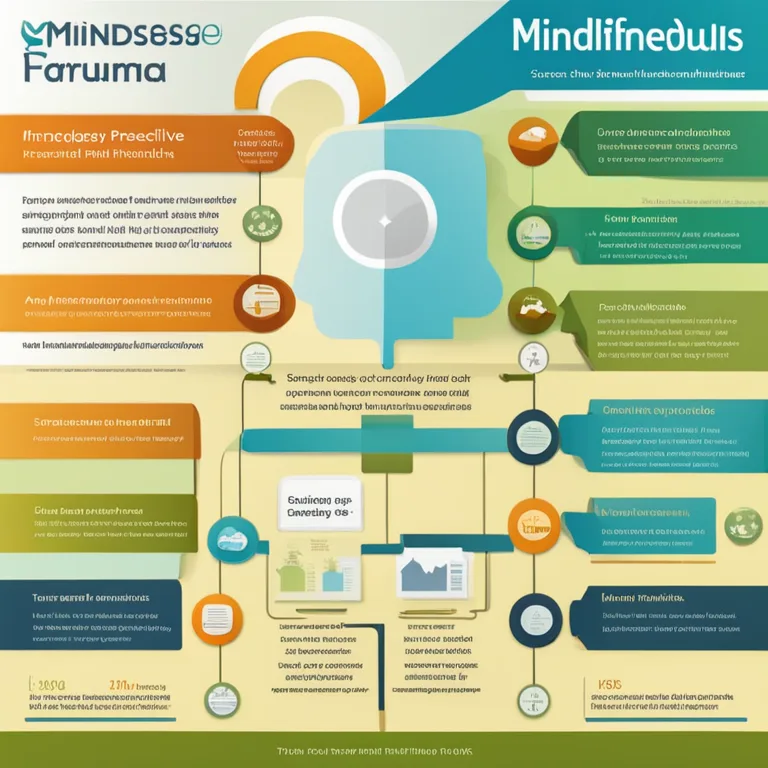
Healing with Presence: Mindfulness for Trauma Recovery
Discover how mindfulness meditation can foster healing and resilience in the face of trauma, promoting emotional and psychological well-being.
article by Hina Kurosawa
Introduction to Mindfulness and Trauma
Mindfulness meditation is a practice deeply rooted in the cultivation of present-moment awareness with an attitude of openness and non-judgment. When facing trauma, one's mind may frequently revisit painful memories, eliciting psychological distress and disrupting emotional equilibrium. Mindfulness offers an alternative path—a way to ground oneself amidst the turbulence of past experiences. It encourages a compassionate witnessing of one's thoughts and feelings without being overwhelmed by them. This therapeutic encounter with the present moment can aid the long journey toward healing from trauma.

The Science Behind Mindfulness for Trauma
Clinical studies in the field of psychotraumatology suggest mindfulness-based interventions can positively impact the brain's response to traumatic stress. Regions like the amygdala, responsible for processing fear and emotional reactions, can become less reactive, while areas like the prefrontal cortex, involved in decision-making and rational thought, can strengthen. Mindfulness practices may thus contribute to a decrease in the symptoms of PTSD and an increase in emotional regulation. With time, these changes can pave the way to a more balanced mental state, enabling survivors to confront their trauma from a place of stability.

Cultivating Safety Through Mindfulness Meditation
Creating a sense of psychological safety is crucial when dealing with trauma. Mindfulness routines, such as focused breathing or body scan meditations, enable individuals to connect with their bodies in the here and now, often serving as an anchor when memories or trauma responses threaten to take over. This feeling of 'being in the body' can be a safe haven, reminding the individual that they are no longer in the traumatic moment but instead are in a secure environment where they can manage their emotions and reactions.

Mindfulness Techniques Tailored for Trauma
Not all mindfulness exercises may be suitable for trauma survivors, as some can inadvertently trigger distressing flashbacks or emotions. Therefore, trauma-sensitive mindfulness strategies have been developed to accommodate these vulnerabilities. Such techniques include shorter meditation sessions, grounding exercises, and the option to keep eyes open to remain connected to the immediate surroundings. Qualified mindfulness-based therapists can also offer trauma-informed guidance, creating a safer therapeutic experience for those in recovery.

Challenges and Considerations
Mindfulness meditation is not a one-size-fits-all remedy and might not be beneficial for every individual suffering from trauma. It is essential for practitioners to approach these methods cautiously and progressively, preferably under the guidance of a trained professional who can help navigate the complexities of trauma-related symptoms. Additionally, mindfulness should complement, not replace, other proven trauma treatments, such as cognitive-behavioral therapy or EMDR (Eye Movement Desensitization and Reprocessing).
Integrating Mindfulness Into Daily Life
As survivors work through their trauma, mindfulness can become a daily refuge, not just a practice but a way of life. Small, consistent efforts, such as taking a few minutes for deep breathing or mindful walking, can accumulate to create substantial changes over time. The essence of mindfulness – being present with compassion and without judgment – can serve as a powerful tool in reestablishing one's sense of control and presence in life's unfolding narrative.
Published: 1/8/2024
Modified: 1/8/2024
More predictions
Come back here soon to learn more about yourself and your future


Meditation's Impact on the Limbic System
Explore how meditation can positively influence your emotional and neurological well-being through its effects on the limbic system.


The Harmony of Mindful Breathing in Meditation
Delve into the symbiotic relationship between meditation, mindfulness, and breathwork to achieve inner peace and clarity.


Mindfulness Meditation Benefits for High Schoolers
Discover how mindfulness meditation can help high school students navigate academic pressure, enhance focus, and improve overall wellbeing.